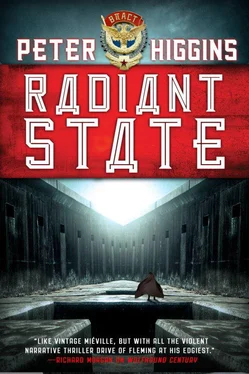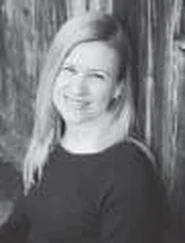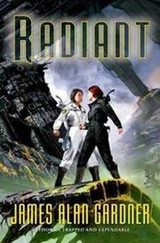She settles the stock of the rifle against her shoulder. Closes her left eye and fits her right eye against the back of the sight. Lets herself relax and sprawl on the ground. Becoming part of it. Settled. Rooted. She has to cock her wrist awkwardly to bring her clawed trigger finger to bear. It feels wrong but she will get used to it.
She fixes the tree in the cross wires. Centres on the place where a particular branch separates from the main bough. Squeezes the slack out of the trigger. The graticule is shivering and taking tiny random jumps. Her heart is busy in her chest. She breathes out, emptying her lungs–calm, calm–and pulls the trigger. The muzzle kicks and deafens her. A puff of dust rises from the wall five feet to the left of the target tree. Waterfowl lift from the mud and circle, puzzled.
Not good.
The woman resettles herself and takes another shot. Forcing her clawed finger to squeeze smoothly.
Two feet to the right of the target. Still not good. But better.
She has put ten rounds aside in a safe place ready for the task itself, which leaves her a hundred and ten to practise with. At ten shots a day that’s eleven practice days. Eleven days in which to remember. Eleven days in which to learn again how to put an entire magazine into a spread she could cover with one hand. She used to be able to do that, six years ago.
Eleven days to get it back. That will be enough.
She has eight cartridges left for this morning’s work. She adjusts the graticule again and prepares herself for another shot.
Galina Cornelius wakes to the empty house. Her sister Yeva is wandering in the woods by the lake and Eligiya Kamilova has gone down to the village to work. Galina is glad to be alone. She has a secret place to go.
She crosses the black stream by a wooden plank and pushes her way along the overgrown margin of the pond, following the rim of still, deep water. The grass, in shadow and still morning-damp, soaks the edge of her skirt. Thorns snag at her clothes and roots try to trip her, but she presses forward. Old statues watch her from the undergrowth with pebble-blank eyes: naked women holding amphorae to their breasts; burly, bearded naked men, long hair curling to their shoulders; a laughing boy riding a big fish. The dark green foliage has almost absorbed them, and some have already lost limbs and faces to winter frost and summer heat. There is a rowing boat beached among the reeds on the lake shore. The oars are still shipped in the bottom but the sky-blue paint on the hull is peeling away. Every time she sees it Galina pictures a mother and her girls, a lilac parasol, a shawl against the cool of the shade, in that boat on the water in the afternoons of summer. She tried to pull it onto the water once, but the wood was soft as cake and came away in pieces.
Galina pushes on towards her destination.
The little concrete building is still there, grey and weather-stained, half ivied-over under the shade of trees. Figurines look down at her from the corners: fat naked children smiling, crumbling, patched with moss. Galina pushes the door open. Inside, in the semi-darkness, there is a dark mouth in the ground, the start of a spiral stone staircase. The air in the stairwell smells cool and earth-scented with a taint of rust. She descends. At the bottom is a narrow tunnel with tiled walls that bow out and then lean in to meet low overhead. The tunnel leads away into gloom, heading out underwater across the floor of the lake, and at the far end is a dim green light. Galina feels her way in near-darkness towards her secret underwater room.
Who knows what kink of imagination caused the people who once lived in the house in the grass to build such a place, a hemispherical glazed dome of white steel ribwork, an upturned glass bowl twenty feet high on the bed of the lake? The water that presses against the glass walls is a deep moss colour at floor level, fading to the palest, faintest green at the top. The steel framework is streaked and patched with rust, and on the other side of the glass is the dim movement of water vegetation and shadowy water creatures. Obscure larvae and gastropods. Muffled fishes. Over the course of the years the lake has rained a gentle silt upon the outside of the chamber, staining the glass yellow and flecking it with patches of muck. The underwater room is filled with dim subaqueous forest light, but when Galina arches her neck to look up she can see light and the undersides of ripples lapping in the breeze, and sometimes the underneath of a waterfowl disturbing the circle of visible surface.
Down here in the underwater room the temperature is constant and cool. The room is furnished. Rugs, a sofa, an empty bookcase, a cupboard, a chair, a desk. A pot of earth stands in the centre of the circular floor, the remains of some long-dead, long-dried plant slumped across it. As Galina moves around, circling, touching, she surprises traces of cigar smoke. The smell of brandy and laudanum lingers in pockets of air.
She has told no one about this place and brought no one here, not Eligiya Kamilova, not even Yeva. It is her own place, where she can come and be herself and think about what she should do. Eligiya Kamilova is not their mother. She has never been a mother to anyone at all. She stays with them and takes care of things, but she would travel further and faster without them; she would go even as far as the endless forest in the east. Eligiya has been in that forest, has travelled there, and it stains the air around her. Part of her is in the forest always and has never come away.
Their mother is in Mirgorod.
I have been too ill to do anything but follow where Eligiya Kamilova went, but that time is coming to an end. I must take Yeva back to Mirgorod. I am the older one, and it is my job to do that. Soon I will be as well and strong as I will ever be, and then I must do that.
But I am not ready, not quite yet.
The rusalka presses its chalky face, expressionless and pale, against the silt-flecked glass and stares in at Galina, watching her intently. It moves its hands through the water slowly as if it were waving. But it is not waving. It is only watching. The first time it came Galina mistook it for the reflection of her own face.
The dead soldier Leonid Tarasenko follows Yeva out from under the trees into the emptiness of tall light. There is a tiny anguished hook of memory somewhere inside him, a diamond-hard strange survivor in the heart, a piece of disconnected understanding no larger than a single word, and the word is child.
The dead man follows child. Child fills his heart with happiness and tears and need. In all the world of the dead man there is only child and follow and no other purpose at all, and the existence of even this one irreducible shard of purpose is a mystery more mysterious than the endless ever-faithful burning of the sun.
But child (all unaware of the following) moves faster than the dead man can. The separation between them stretches and stretches.
The dead man would call out after her if he could, but there is not enough wonder and mystery in the world to provide him with concepts like voice and call. He has been given only child and follow, and it is not enough.
Child is gone.
He moves on, following the line she took. Child is gone, but of following there is no end and nothing else to take its place.
The line of his following brings him again to an edge of trees, different trees, but trees. Trees are familiar to him and the smell of earth is familiar beneath them, and that is a soothing ointment for his heart, but also not soothing at all; nothing takes away the happiness and the tears and the need for following child.
Because trees are familiar to him the dead Leonid Taresenko follows his following in under the trees.
Читать дальше












